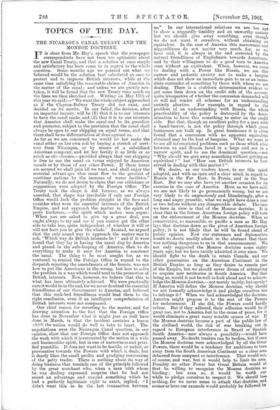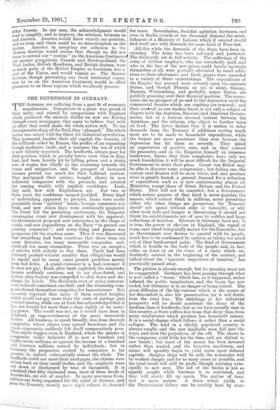TOPICS OF THE DAY.
THE NICARAGUA CANAL TREATY AND THE. MONROE DOCTRINE.
IT is dear from Mr. Hay's speech that the newspaper correspondents have not been too optimistic about the new Canal Treaty, and that a solution at once simple and satisfactory has been come to in regard to the whole question. Some months ago we pointed out what we believed would be the solution best calculated at once to protect and to improve British interests, while at the same time satisfying the reasonable claims of America in the matter of the canal ; and unless we are greatly mis- taken, it will be found that the new Treaty runs much on the lines we then sketched out. Writing on May 11th of this year we said:—" We want the whole subject approached as if the Clayton-Bulwer Treaty did not exist, and decided on its merits. In our belief, the decision, after an impartial inquiry, will be (1) that it is to our interests to have the canal made, and (2) that it is to our interests that America shall make the canal and be its guardian and protector, subject to the provision that the canal shall always be open to our shipping on equal terms, and that there shall be no differentiation of dues against us As far as we are concerned, we would let her make the canal either on her own soil by buying a stretch of terri- tory from Nicaragua, or by means of a subsidised American company, and let her fortify it as little or as much as she chooses,—provided always that our shipping is free to use the mial on terms enjoyed by American vessels or by those of any other Power. If those terms are secured we shall gain all we want, and shall enjoy. the material advantages that must flow to the greatest of maritime nations by the increase of water facilities." Naturally, we do not desire to claim that our criticisms or suggestions were adopted by the Foreign Office. The Treaty took the shape it did because, as we always asserted, that shape was inevitable if only our Foreign Office would look the problem straight in the face and consider what were the essential interests of the British Empire, and not approach the matter in the spirit of petty hucksters, — the spirit which makes men argue : When you are asked to give up a great deal, you ought always to try and see if you cannot get the other side to take less, quite independent of whether it will or will not hurt you to give the whole.' Instead, we argued that the only sound way to approach the matter was to ask, Which way do British interests lie ? ' and if it were found that they lay in having the canal dug by America and placed in the safe-keeping of America, then to do everything to make it easy for America to construct the canal. The thing to be most sought for, as we ventured to remind the Foreign Office in regard to the despatch rejecting the amendments of the Senate, was not how to put the Americans in the wrong, but how to solve the _problem in a way which would tend to the promotion of British interests. Now, however, we believe that this is what has been ultimately achieved. We were practically sure it would be in the end, for we never doubted the essential friendliness of our Government to America, and believed that this rock-bed friendliness would lead them to the right conclusion, even if an intelligent comprehension of British interests were not compassed. Our chief reason for reverting to the matter, and for drawing attention to the fact that the Foreign Office has done in November what it might just as well have done in March, is that the incident contains a lesson which the nation would do well to take to heart. The negotiations over the Nicaragua Carial question, in our opinion, show, that our Foreign Office does not approach the work with which it is entrusted by the nation in a wide and businesslike spirit, but in one of narrowness and petri- fied punctilio. It does not want to be hostile, or unfair, or provocative towards the Powers with which it deals, but it dearly likes the small profits and grudging concessions of the petty trader. There is nothing about its way of doing business that reminds, one of the principle followed by the great merchant who, when a man with whom he was dealing expressed surprise that he had not seized an advantage and . exacted something which he had a perfectly legitimate right to exact, replied: "I didn't want this to be the. last transaction between' us." In our international relations we are too apt- to show a, niggardly timidity and an unworthy anxiety lest we should give away something, even though we do not want it ourselves, without obtaining an equivalent. In the case of America this narrowness and niggardliness do not matter very much, for, as we have said, it is always in the end corrected by the natural friendliness of Englishmen towards Americans, and by their willingness to do a good turn to America, even without an equivalent. When, however, we come to dealing with a Power like Russia, we see this narrow - and pedantic anxiety not to make a bargain which does not show an immediate gain to us or an imme- diate surrender of something by those with whom we are dealing. There is a stubborn determination evident to get some item down on the credit side of the account quite irrespective of whether the concession demanded will or will not render all schemes for an understanding entirely abortive. For example, in regard to the problem of an understanding with Russia, the whole practicability of the policy is destroyed by the deter- mination to have this something to enter on the credit side. But that, though an excellent policy for a man with a hand-barrow, is not the policy through which great businesses are built up. In great businesses it is often found that a concession with no apparent equivalent obtained may be the best of bargains. What we want is to see all international problems such as those which arise between us and Russia faced in a large and not in a narrow spirit, and to see the dominant question,—not "Why should we give away something without getting an equivalent ? " but "How can British interests be best served in dealing with this matter ? "- We desire, as our readers know, to see this spirit adopted, and with an open and a clear mind, in regard to Russia in the Far East, in Persia, and in the Near East. But we may also have yet another occasion for its exercise in the case of America. Here, as we have said, we are not likely to go permanently wrong, but we are very likely to do ungraciously and blunderingly, after a long and angry grumble, what we might have done a year or two before without any disagreeable debate. The case we have in view is that of the Monroe doctrine. It is clear that in the future American foreign policy will turn on the enforcement of the Monroe doctrine. When so conservative, so reasonable, so pacific a man as Mr. Hay lays that doctrine down as the pivot of American foreign policy, it is not likely that he will be found ahead of public opinion. Now our statesmen and diplomatists would no doubt readily admit in the abstract that there was nothing dangerous to us in that announcement. We not only suggested the Monroe doctrine some eighty years ago, but we have tacitly admitted it ever since. We should fight to the death to retain Canada and our other possessions on the American Continent in the British Empire so long as they desire to remain part of the Empire, but we should never dream of attempting to acquire new territories in South America. But that being so, would it not be well to look ahead and to acknow- ledge the Monroe doctrine,—not merely tacitly, but openly? If America will define the Monroe doctrine, why should we not formally acknowledge it and pledge ourselves not to infringe it? When we had acknowledged the doctrine, America might propose it to the rest of the Powers for endorsement. If she did, the Powers could hardly refuse. But if they adhered, their adhesion would be of great use, not to America but to the cause of peace, for it would eliminate a great many notable causes of war. If the Monroe doctrine became a part of the public law of the civilised world, the risk of war breaking out in regard to European interference in Brazil or Spanish South America—now always a possibility—would have passed away. No doubt treaties can be broken, but if once the Monroe doctrine were acknowledged by all the Great Powers, there would be a tendency for ambitions to turn away from the South American Continent as a close area debarred from conquest or interference. That would not, of course, end war, .but it would help to limit its area. Possibly no other Power but Great Britain would at first be willing, to recognise the Monroe doctrine as binding ; but even so, it would be worth our while to pledge ourselves to respect it. We should lose nothing, for we never mean to attack that doctrine, and sooner or later our example would probably be followed bi other Powers. In any case, the acknowledgment would tend to simplify, and so improve, the relations between us and America. America would know exactly our position, and we hers, and there could be no misconception on the matter. America in accepting our adhesion to the 7.,lonroe doctrine would realise that though we did not mean to extend our " system " on the American Continent, our present pos%ssions, Canada and Newfoundland, the West Indies, British Honduras, and British Guiana, were as much parts of the British Empire as Louisiana was a part of the Union, and would remain so. The Monroe doctrine, though preventing any fresh territorial expan- sion by us on the American Continent, would in effect guarantee to us those regions which we already possess.











































 Previous page
Previous page